Key takeaways:
- Border-related anxiety arises from uncertainty and fear, influenced by personal experiences and media narratives.
- Coping strategies, such as mindful breathing and creating travel plans, can help manage anxiety when crossing borders.
- Seeking professional help and building a support network are crucial for individuals struggling with border-related fears.
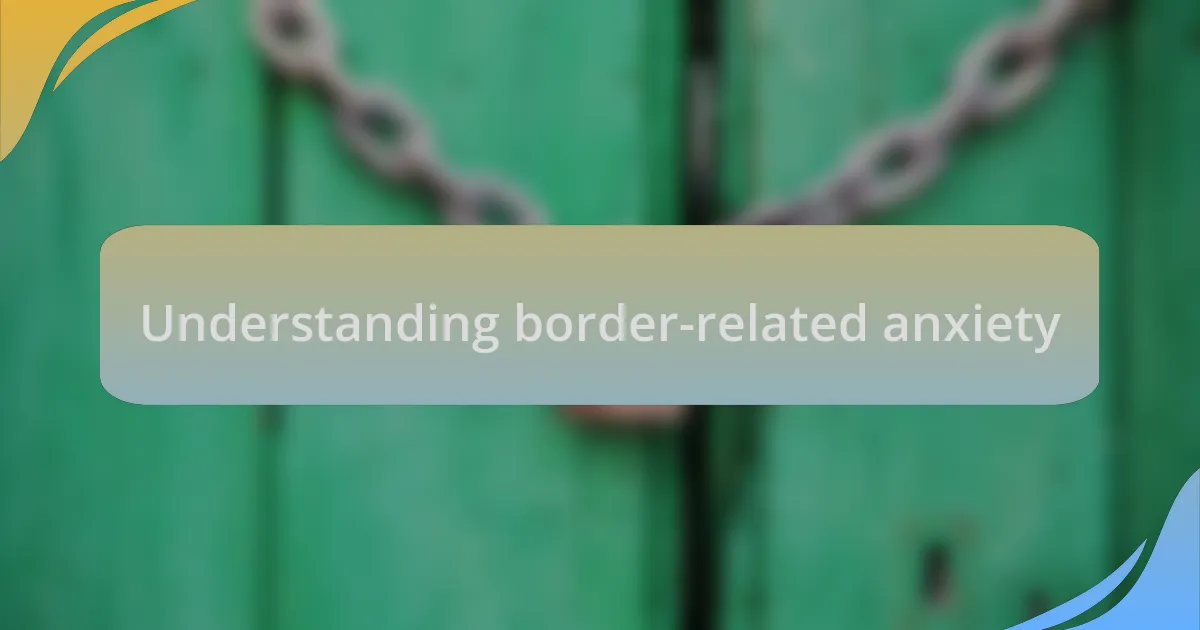
Understanding border-related anxiety
Border-related anxiety often stems from the uncertainty surrounding crossing borders, whether between countries or simply at checkpoints. I still remember the first time I crossed an international border alone; my heart raced as I approached the customs officer. What would they ask me? Would they believe my story? That feeling of vulnerability can be overwhelming, especially in a world where political tensions can change unexpectedly.
This anxiety can manifest in various ways, from sweaty palms to racing thoughts. I’ve talked to friends who have experienced similar feelings—some even avoid traveling altogether because the stress is too much. It makes me wonder, how many experiences are we missing out on because of this hidden fear? The emotional weight of not knowing what could happen at the border can create a significant barrier to enjoying travel and exploration.
Understanding the roots of border-related anxiety is important for those experiencing it. For me, it’s about recognizing that these feelings are common and valid. It’s easy to feel isolated in this experience, but talking to others can reveal a collective struggle. Don’t you find that sharing your concerns often lightens the load? When we acknowledge our fears, we can begin to find coping strategies that work for us personally.
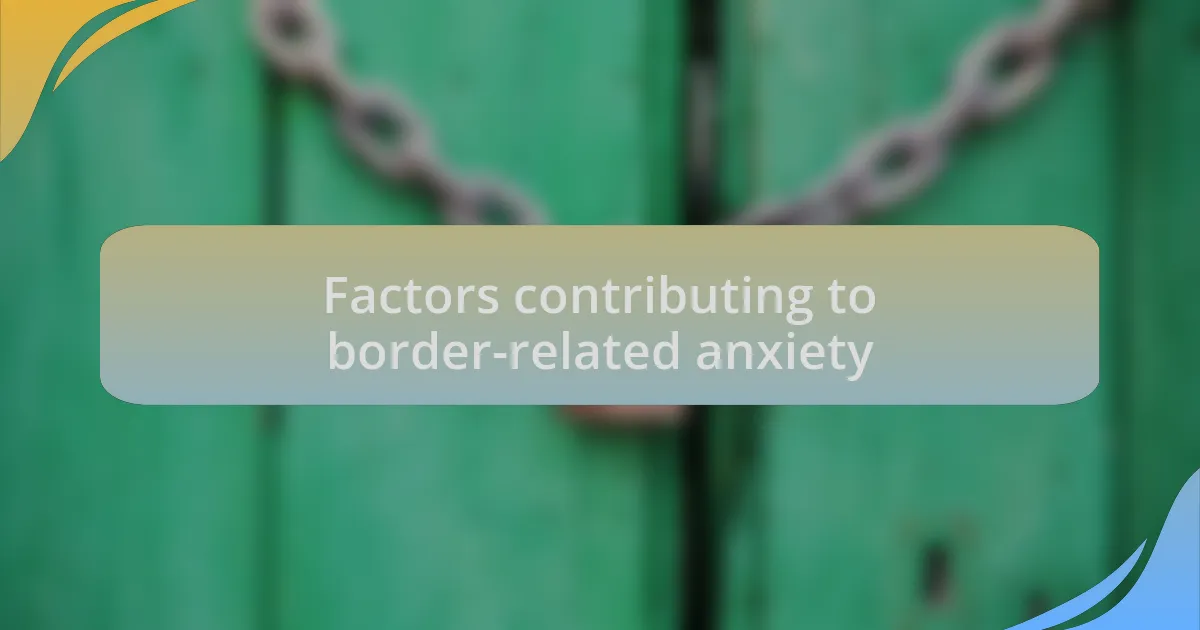
Factors contributing to border-related anxiety
Border-related anxiety can be influenced by personal experiences that shape our perceptions of safety and trust. I vividly recall a trip where I witnessed someone being detained at a border due to an honest mistake. The sheer panic in the air was palpable. It left me questioning, “What if that were me?” Such moments can amplify the fear of unexpected repercussions, making anyone think twice about potential travel plans.
Moreover, the media plays a significant role in shaping our views of border security issues. News stories about immigration policies or border crises often highlight worst-case scenarios, which can create a sense of urgency and dread. Sometimes, I find myself consumed by these reports, wondering how they could affect my travels. This constant barrage can easily morph into a distorted perception of danger, where even the simplest border crossing feels fraught with risk.
Lastly, the political climate contributes greatly to anxiety related to borders. For instance, during heightened tensions between nations, my apprehension tends to spike whenever I think about traveling abroad. It’s like a shadow that looms over the excitement of adventure. Have you felt that way too, where external circumstances invade your sense of wanderlust? Knowing that larger forces can affect individual experiences often adds an extra layer of stress, making the journey feel less about exploration and more about survival.
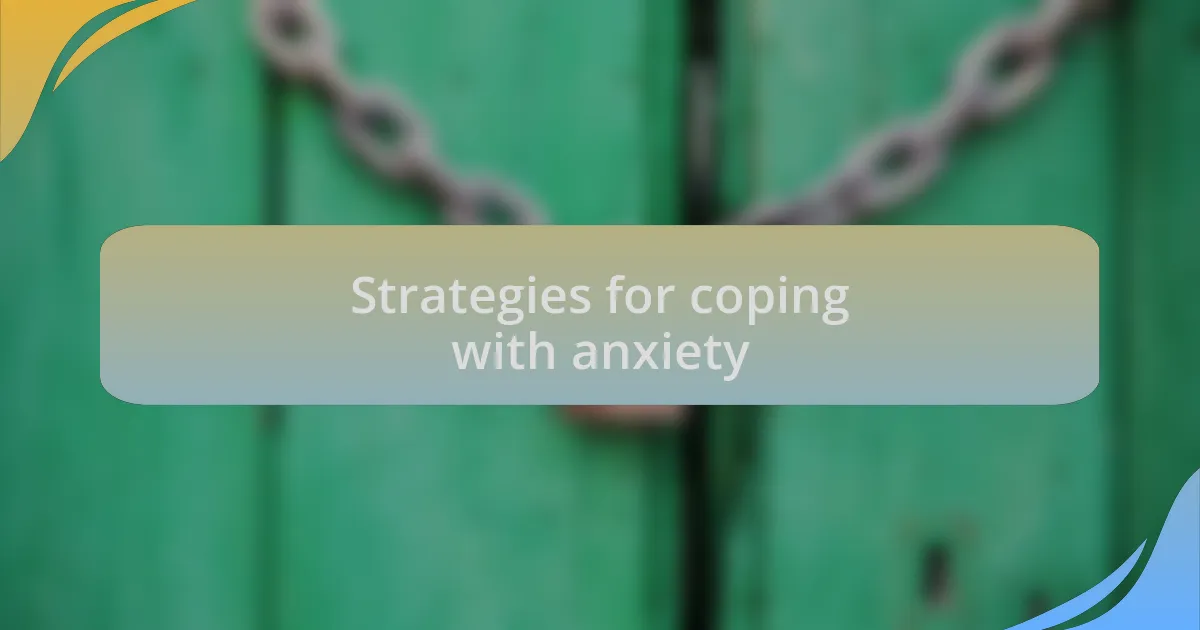
Strategies for coping with anxiety
Managing anxiety, especially related to border experiences, is crucial for maintaining a sense of calm. One strategy that has worked for me is to practice mindful breathing. When I feel that familiar tightness in my chest before a border crossing, I take a moment to close my eyes and focus on my breath. This simple act helps ground me, shifting my attention from worry to the present moment. Have you ever tried it?
Creating a plan for travel can also be immensely comforting. I remember mapping out my itinerary in detail before a trip, including potential delays and what to do in case of unforeseen circumstances. Having a clear plan can serve as a safety net, allowing me to feel more prepared and less anxious. Knowing that I have strategies in place gives me that much-needed sense of control.
Finally, engaging in positive self-talk can be a powerful tool. I often remind myself that many travelers face similar anxieties but still manage to explore the world. By challenging negative thoughts, I empower myself to push through discomfort. So, the next time you find anxiety creeping in, consider replacing doubt with encouragement. How might that change your perspective?
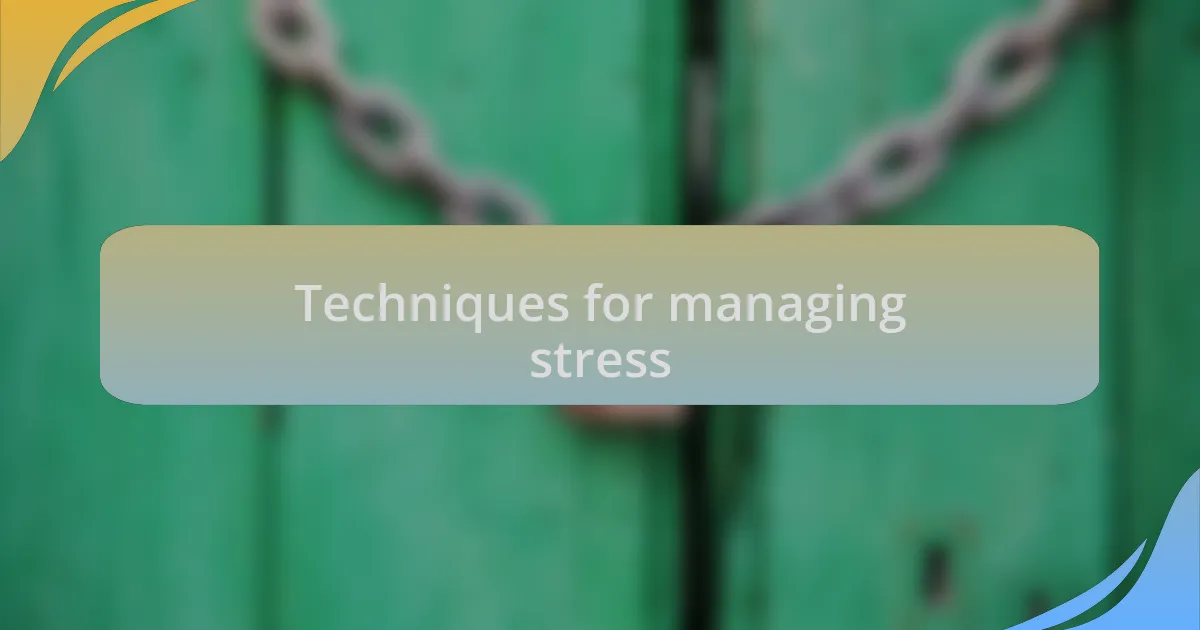
Techniques for managing stress
I find that incorporating physical activity into my routine is incredibly effective for managing stress. Whether it’s a brisk walk or a quick yoga session, getting my body moving releases those feel-good endorphins. There’s something liberating about breaking a sweat, don’t you think? It shifts my mental state significantly, allowing me to tackle anxiety head-on.
Another technique I swear by is journaling. At times, I’ve felt my mind swirling with racing thoughts, but putting pen to paper helps me declutter those chaotic feelings. Reflecting on my experiences and expressing my emotions in writing not only provides clarity but also serves as an emotional outlet. Have you ever tried capturing your thoughts this way? It can be surprisingly revealing.
Lastly, I find that connecting with others plays a crucial role in managing stress. Reaching out to friends or family who understand my border-related anxieties creates a support system that feels reassuring. Sharing my experiences and listening to their perspectives often leads to unexpected insights. In those moments of connection, I realize that I’m not alone in my journey, which can be a comforting thought, don’t you agree?

Seeking professional help
When I first considered seeking professional help, I felt a mix of nervousness and hope. It’s a big step, isn’t it? I remember sitting in a therapist’s office, thinking about all the anxieties I had bottled up. The moment I started sharing my feelings about border-related concerns, I felt a weight lift. It was refreshing to have someone listen without judgment, and I quickly realized that it’s okay to ask for help.
The process of finding the right therapist can feel daunting, but I suggest doing some research first. I learned that many professionals specialize in anxiety related to specific life experiences, and that can make a world of difference. I found comfort in knowing that these experts understood my unique situation. Have you ever considered how a specialist could tailor their approach to your specific fears? It’s reassuring to realize that help is available and can be customized.
Another aspect of therapy that surprised me was the emphasis on coping strategies. I didn’t just talk about my anxieties; my therapist guided me through practical techniques to manage them in real-time. One technique I still use involves deep breathing exercises, which can ground me during moments of panic. It’s a simple yet powerful tool that has transformed how I approach stressful situations—wouldn’t you agree that having such resources can empower you?
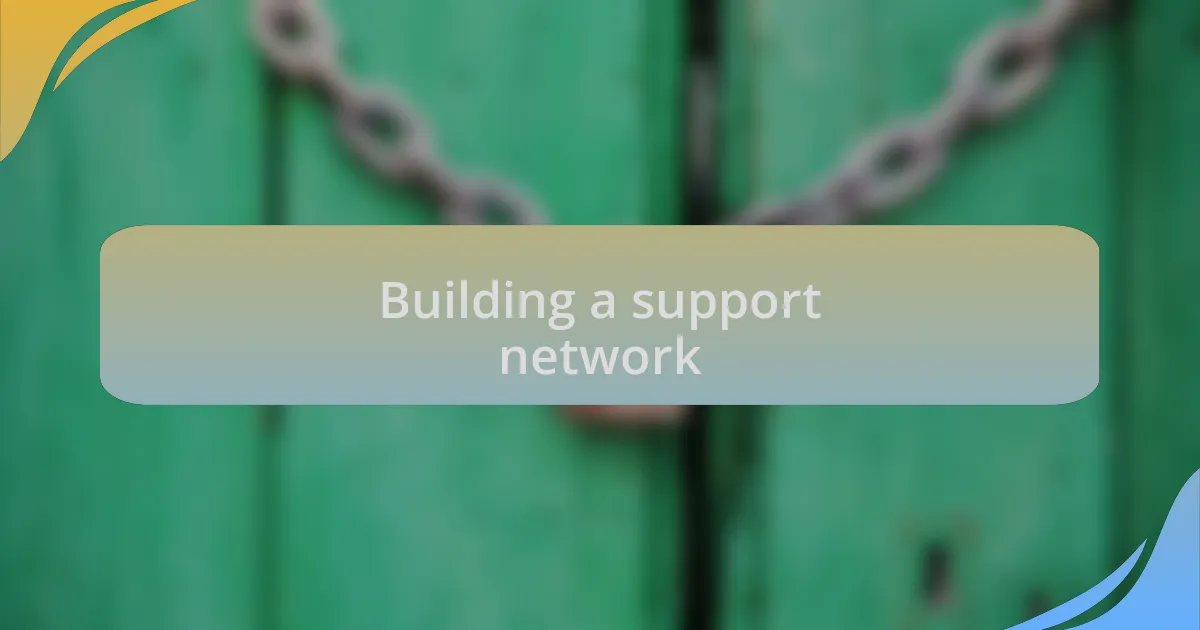
Building a support network
Building a support network is crucial when dealing with border-related anxiety. I remember the first time I reached out to friends and family, feeling both vulnerable and relieved. Sharing my worries with those I trust not only eased my burden but also reinforced our connections. Have you thought about how your loved ones could be a source of comfort in difficult times?
In my experience, joining support groups can be incredibly beneficial as well. When I attended my first session, I was surprised by how quickly I felt understood by others who shared similar fears. Hearing their stories made me realize I wasn’t alone; it gave me a sense of belonging. Isn’t it amazing how that feeling of community can uplift your spirits, especially when navigating worries related to borders?
Moreover, I learned that building a diverse network is essential. Surrounding myself with a mix of friends, mentors, and even online communities has provided me with various perspectives and coping techniques. I’ve found that different people can offer unique insights; for example, some may focus on mindfulness practices while others suggest practical steps to ease worries. If you take a moment to consider your own network, do you see people who can offer support in different ways?